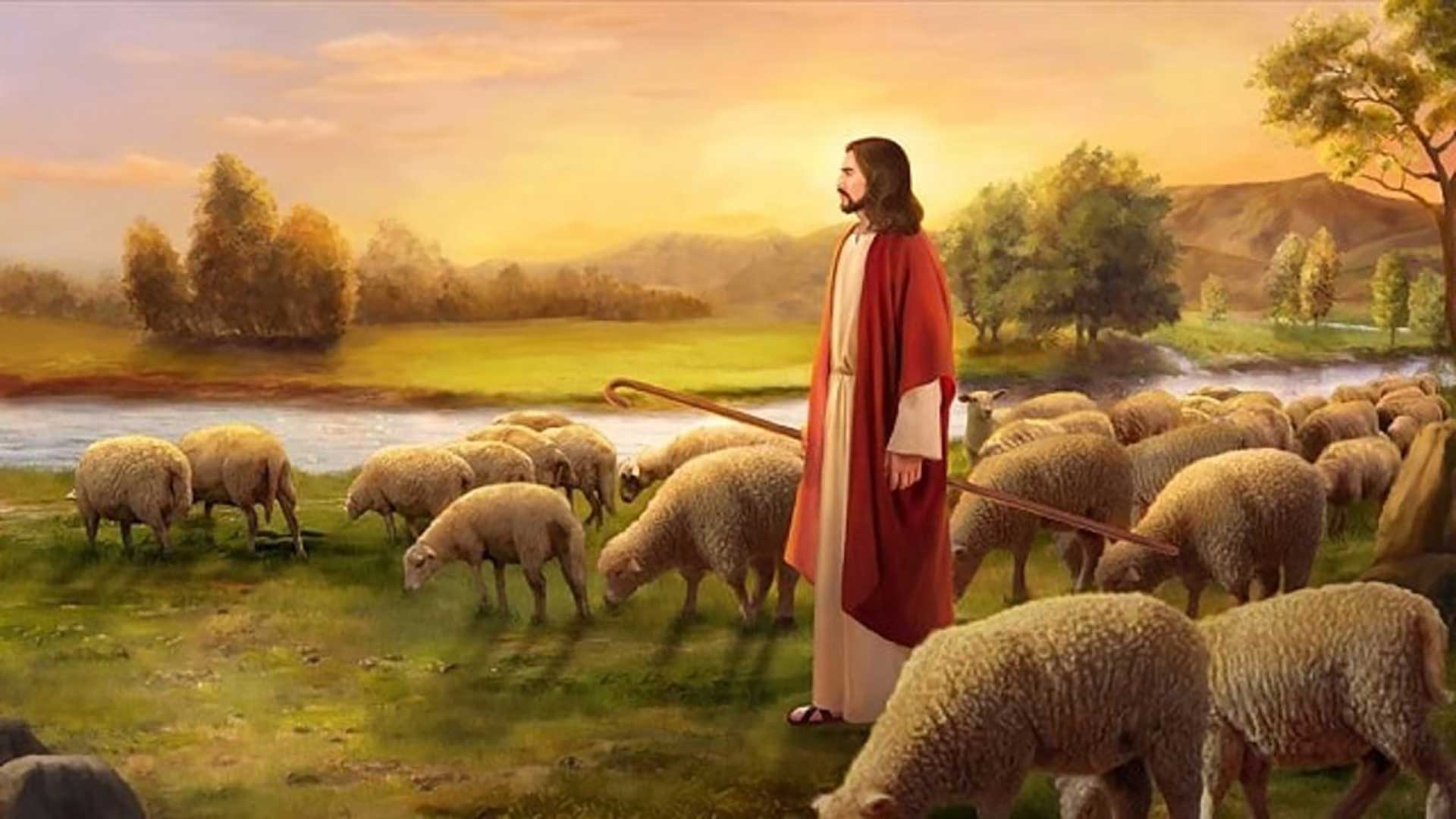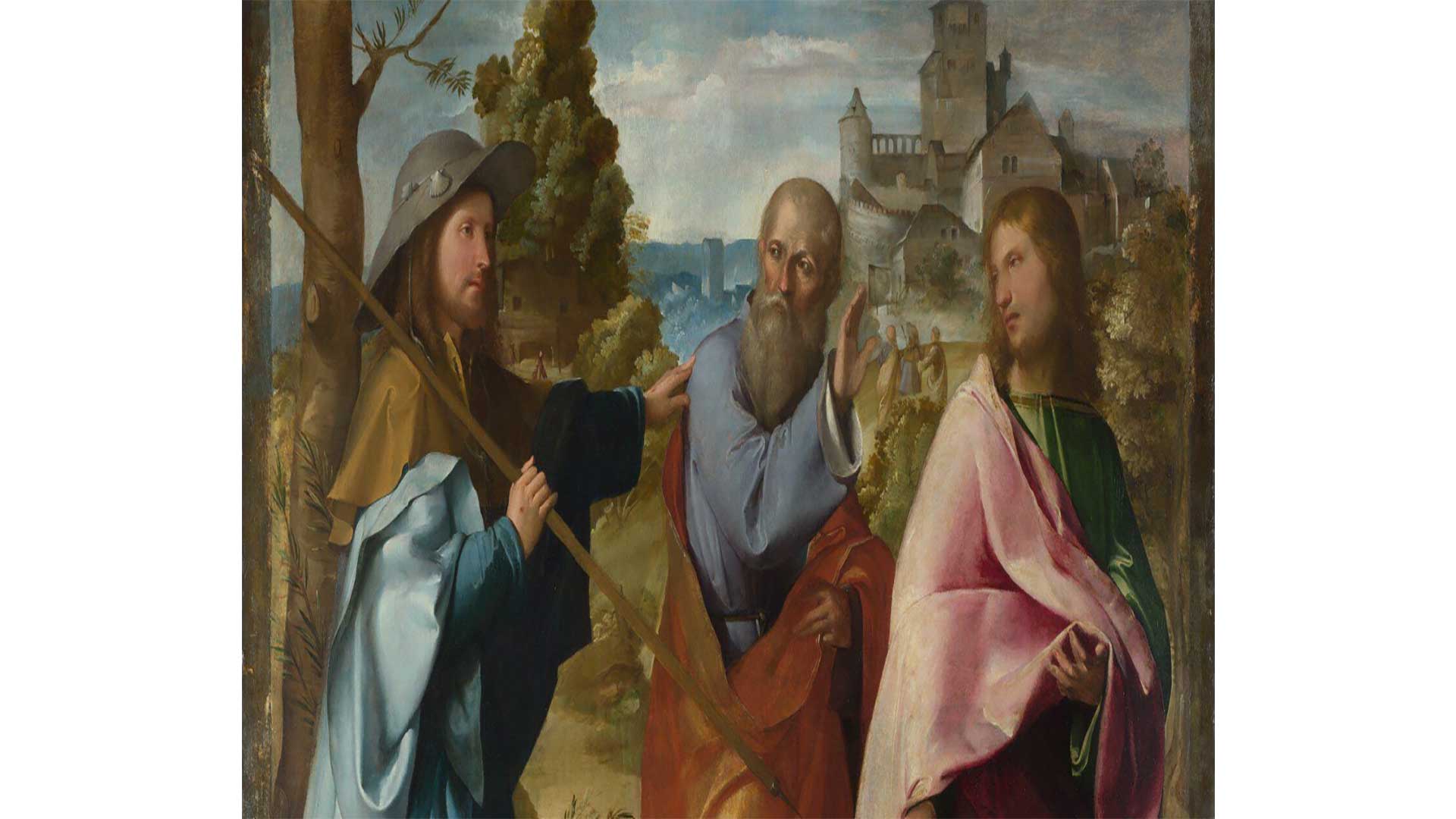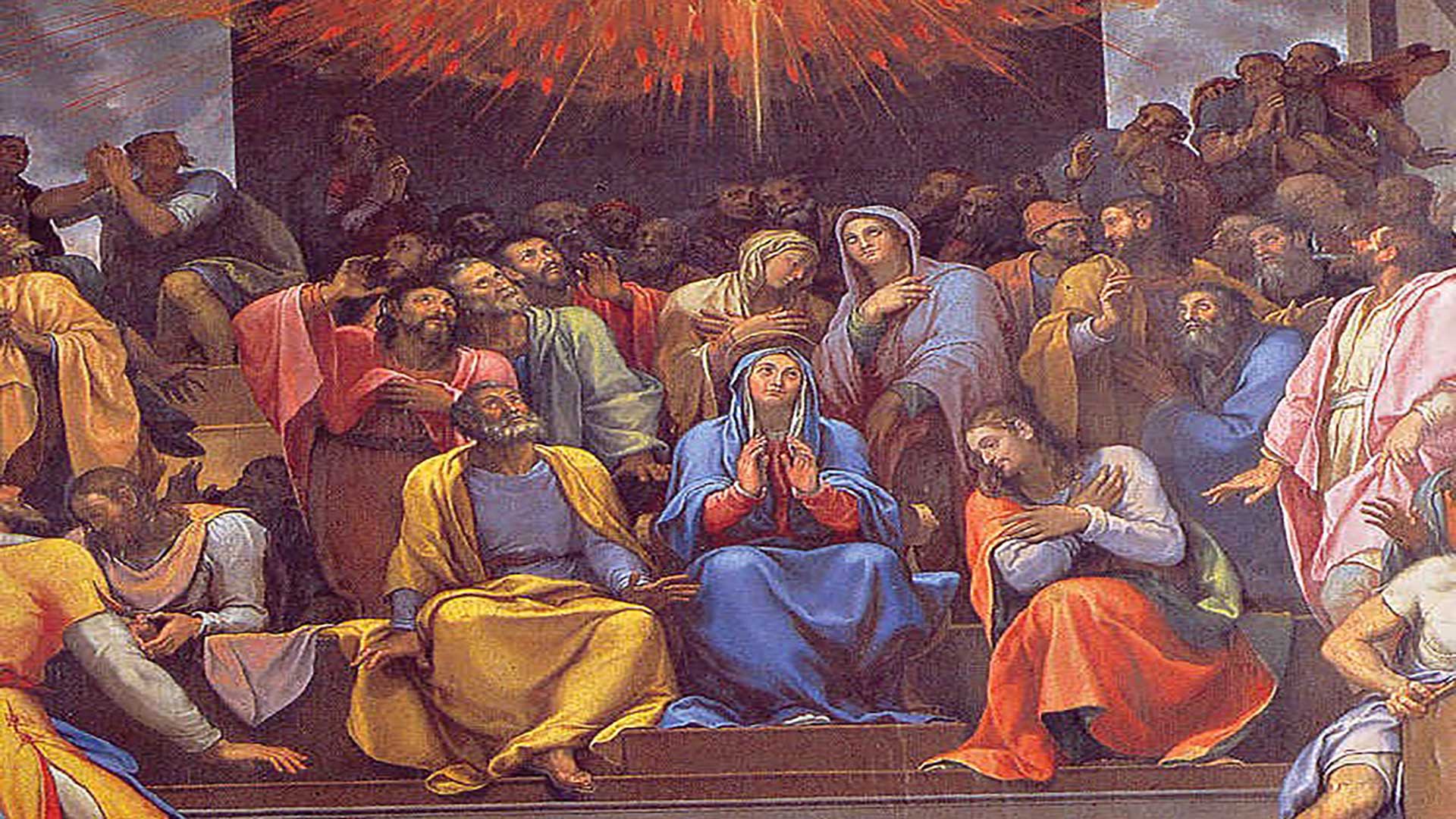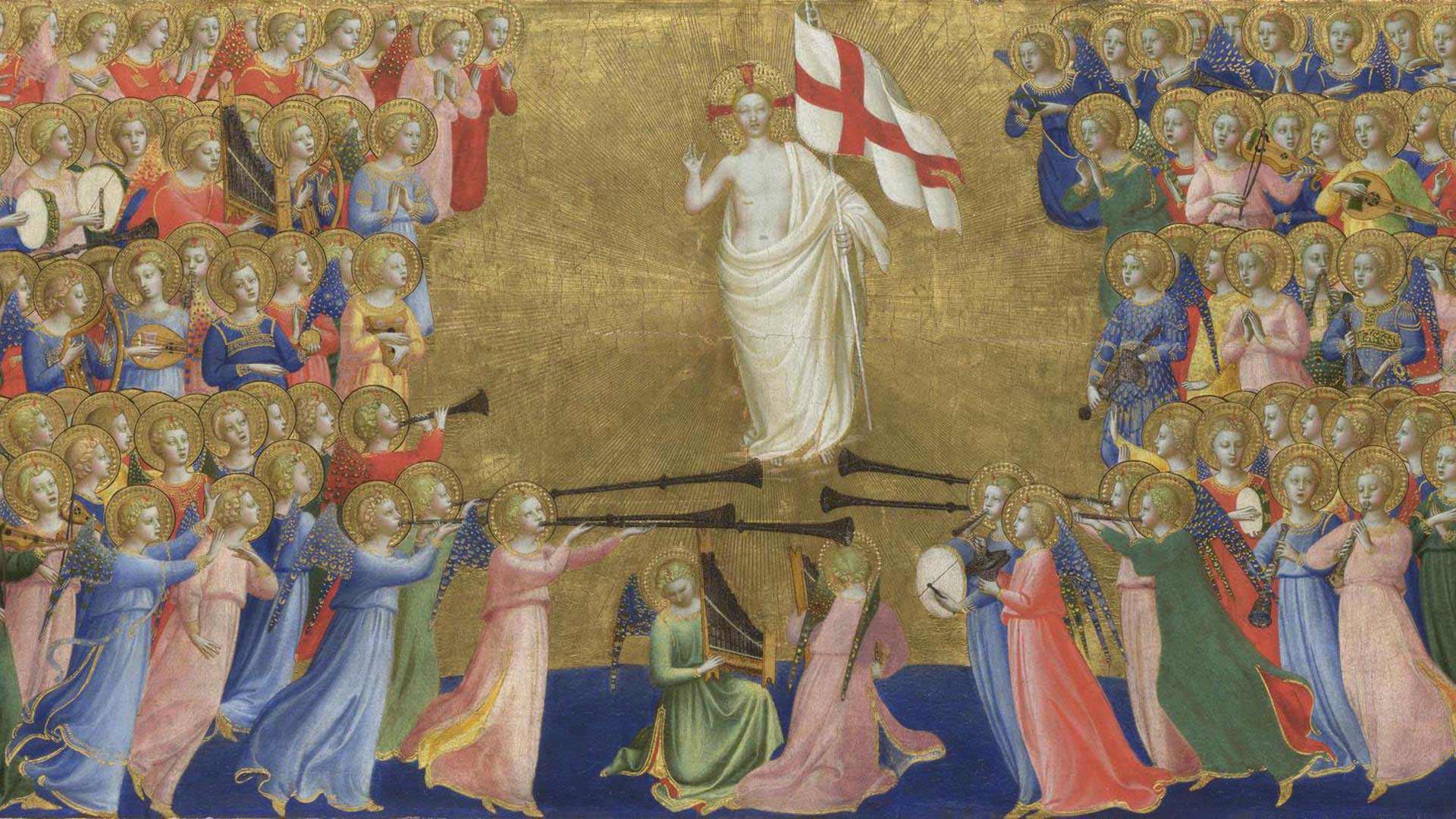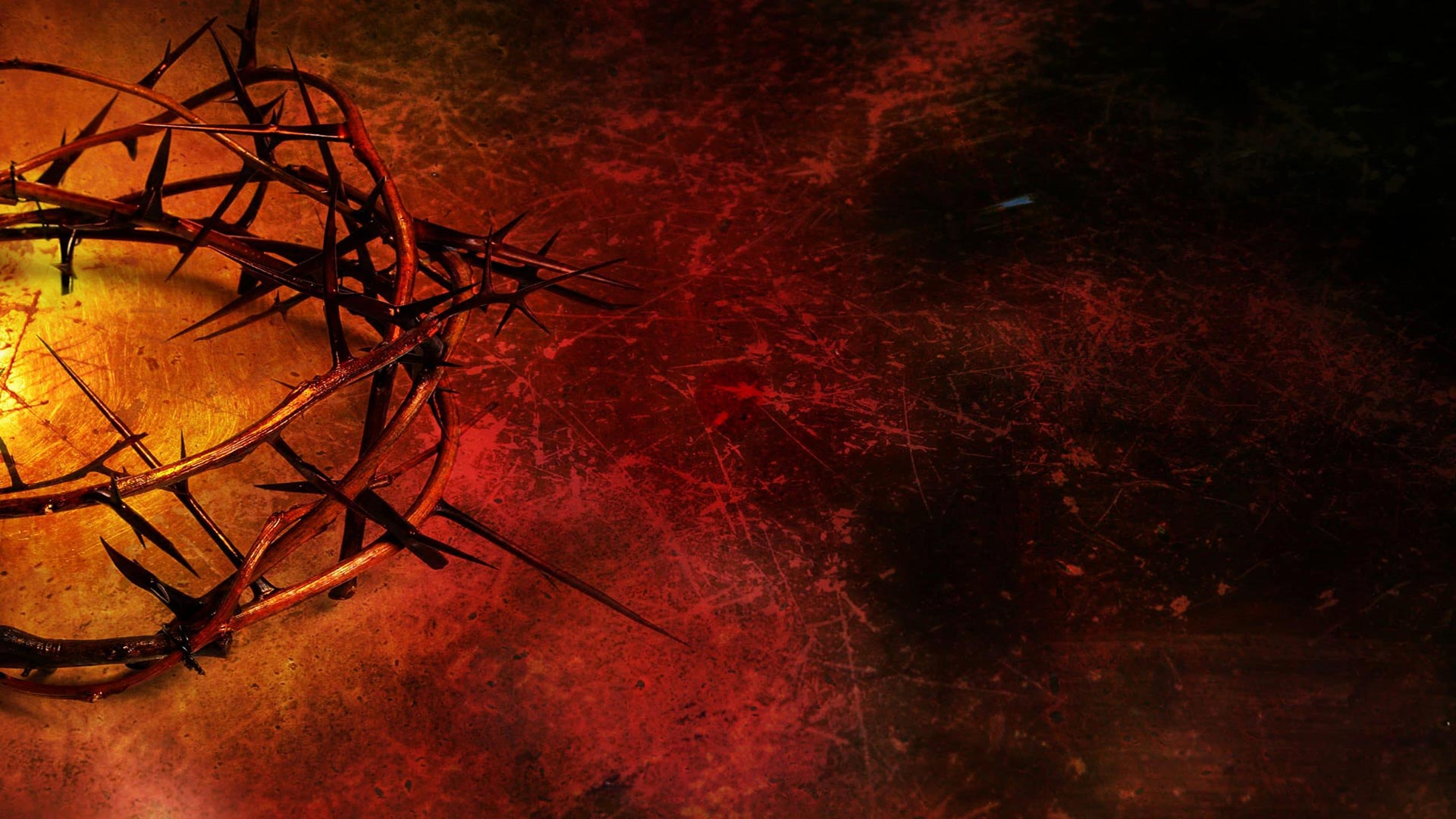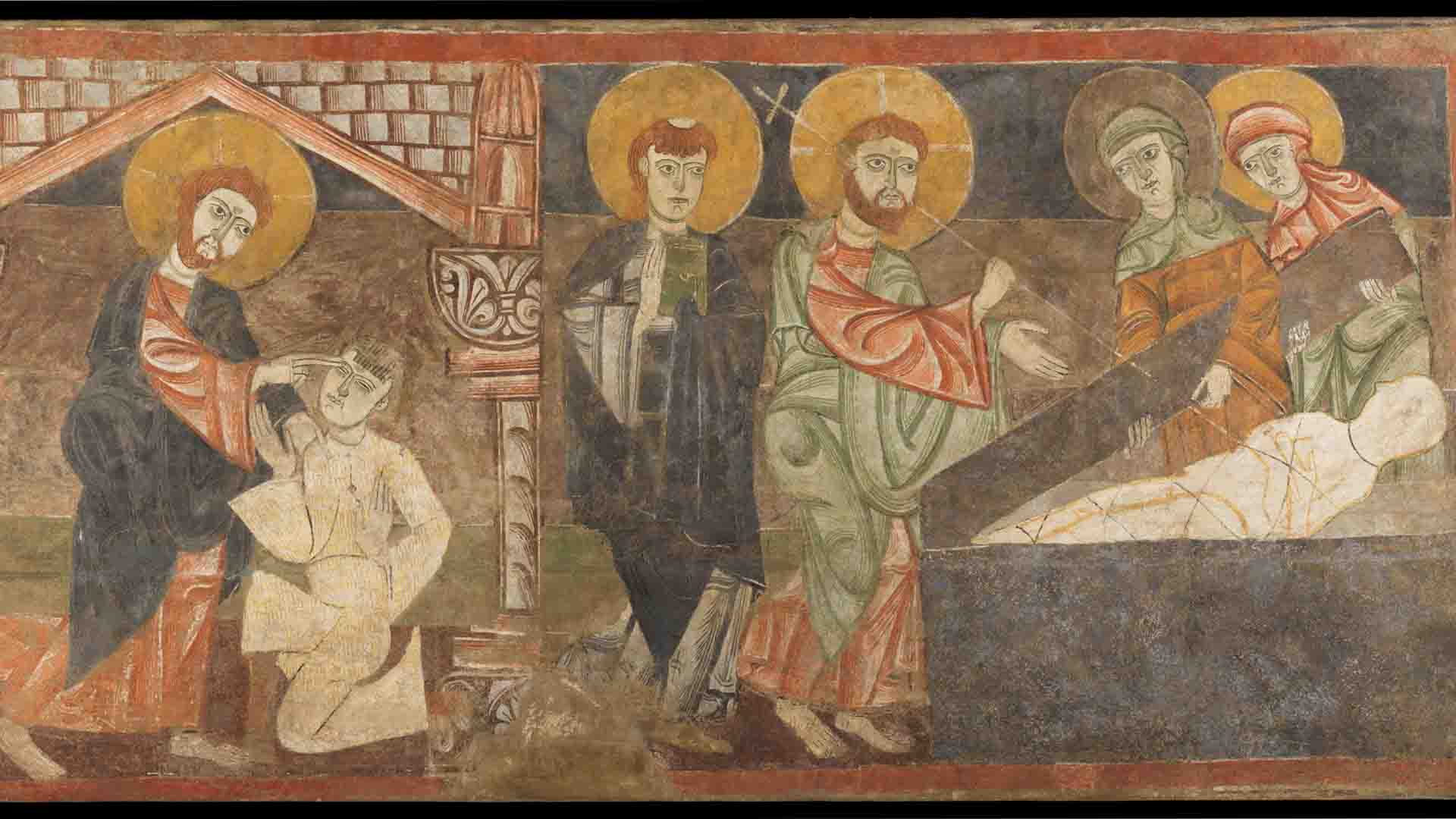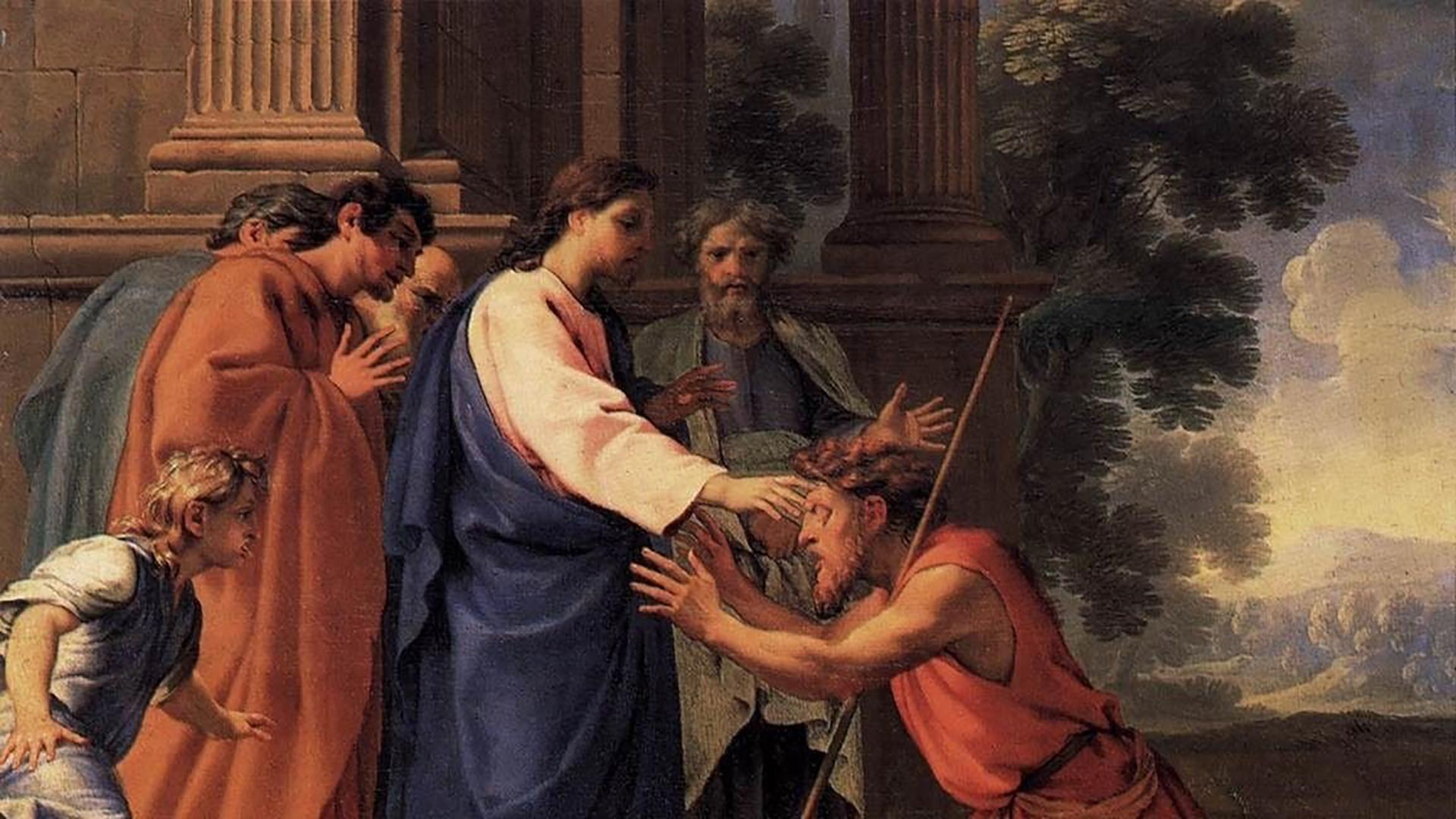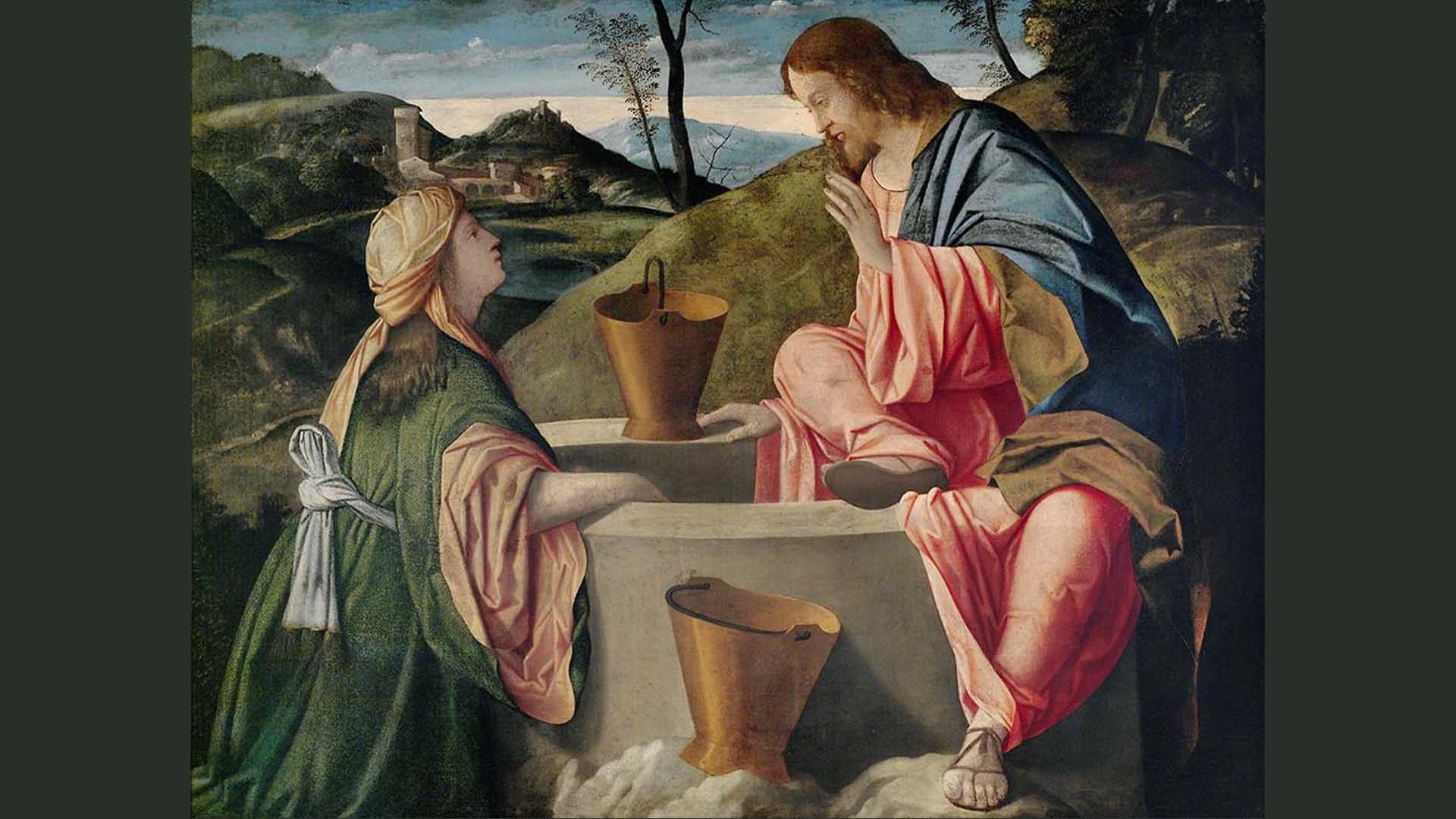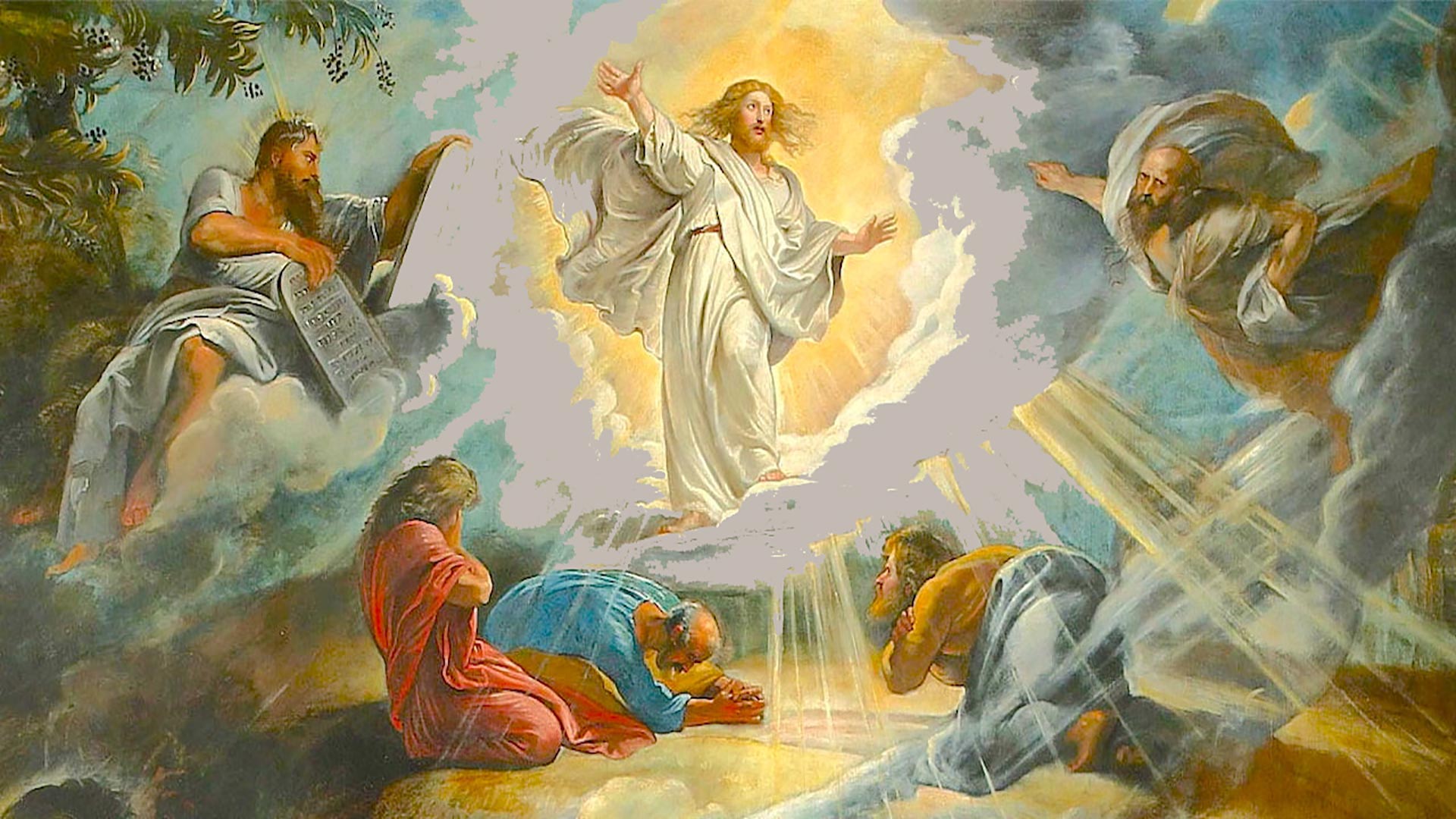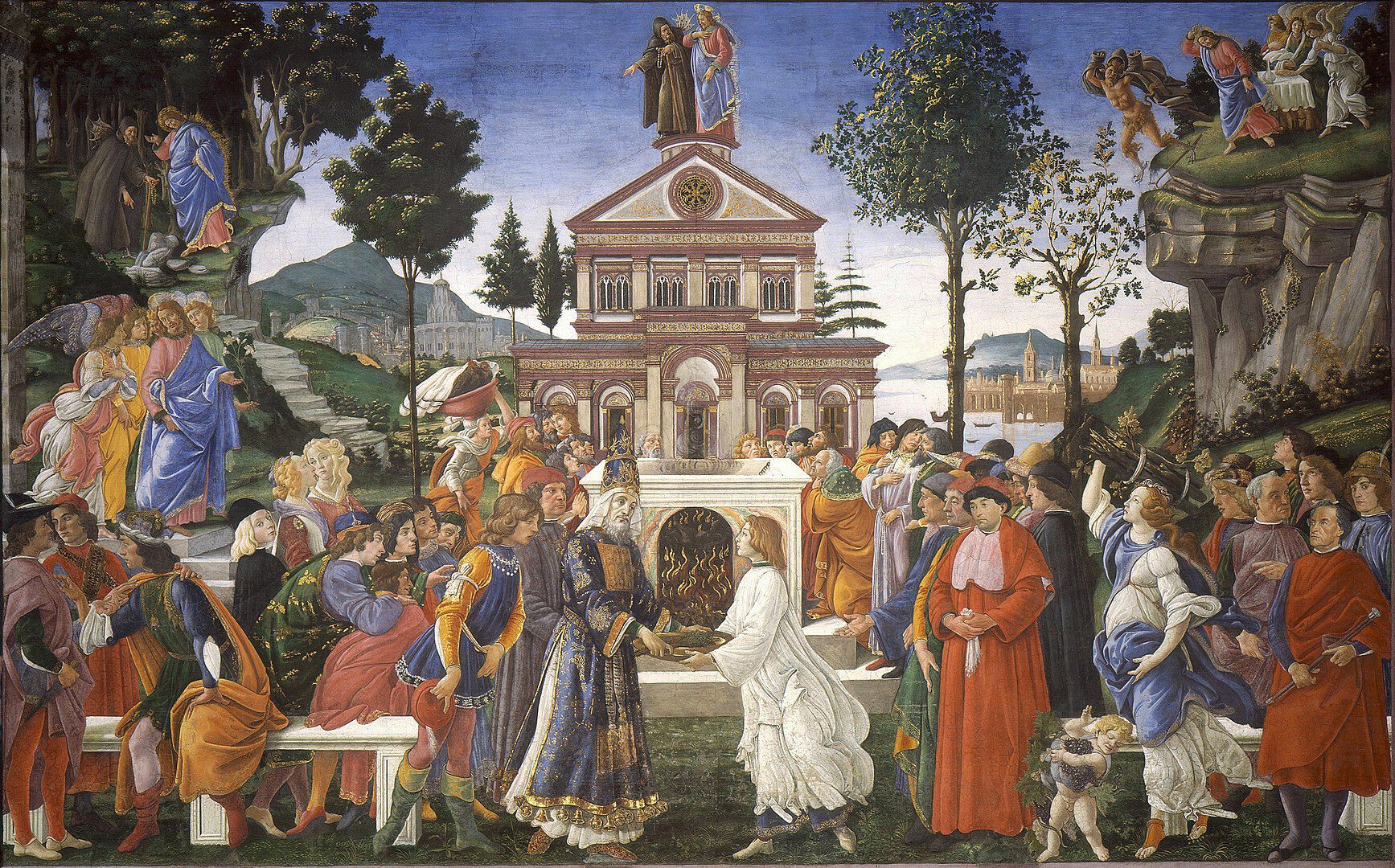“The Lord is my Shepherd”
In our somewhat directionless world, isn’t it reassuring to hear our inner voice say, “The Lord is my shepherd, there is nothing I shall want”? These verses from the David’s Psalm echo through the three Readings of today; not only were they said by Jesus in His own lifetime, Peter repeats them endlessly after the Resurrection.
After the Resurrection, it was important to catechise. We see once again, in the First Reading (Acts 2: 14, 36-41), how the first Apostle reproached people for putting Jesus to death and urged them to repent. The reward for their repentance would be to receive “the gift of the Holy Spirit”. The pardon of our sins, the gift of the Holy Spirit and the New Covenant are the fulfilment of messianic promises. They are open to anyone who accepts the Word of God and transforms their life. And what a privilege, as St Peter puts it, “The promise is to you and to your children and to all that are far off, every one whom the Lord our God calls to Him.”
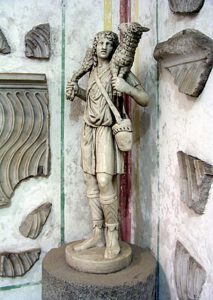
Again, in his First Letter, part of which forms the Second Reading of today (1 Pet 2: 20-25), St Peter conscientizes the people. He talks about how Jesus who is at once our Shepherd and Paschal Lamb. By His voluntary Sacrifice, He showed us the way from death to life eternal. St Peter therefore invites us to suffer, as Jesus did, in the midst of life’s difficulties, which include misunderstandings, calumnies, accusations and persecutions, all of which Christians suffer for being a stumbling block and rock of offence to the world.
Through it all, we learn from the Gospel (Jn 10: 1-10), we have nothing to worry, for Jesus the Good Shepherd is always by our side. He knows His Father in Heaven very intimately, and know us too with the same intimacy. He thus becomes “the door” to Heaven, the Mediator par excellence to our Father in Heaven. And His warning against false teachers and doctors – “thieves and robbers” all – is valid for all times, especially our own. He is the Way, the Truth and the Life; He is our only salvation. He is the door; anyone who enters by Him alone will be saved.
This Sunday, then, is rightly known as “Good Shepherd Sunday”. May we trust only Jesus to be our Shepherd through life; through Him alone can we have life, and life in abundance. Above all, may our Pope, our bishops and priests be good shepherds, taking the lay faithful always to the right pasture.
The Challenge of Faith
Today’s Gospel, taken from St Luke (24: 13-35), is about what happened on the evening of the Resurrection and how the eyes of two disciples were kept from recognising Jesus who had just then joined them on the road to Emmaus. Jesus feigned ignorance of the things that had happened in those momentous days. Rather, He heard what they had thought of Him: that He was a prophet expected to redeem Israel, and now His body was reported missing.
Were they feeling it was all over now? Just then, the fellow traveller lamented their foolishness and how they were “slow of heart to believe all that the prophets have spoken.” But none of that hurt their self-esteem; they even invited the stranger to stay the night with them. And it was there at the table – when He took the bread and broke it – that their eyes saw Jesus; but he had meanwhile vanished out of sight.
What about us, traditional Catholics? We who have been with the Lord all these years, do we know Him up close and personal, or do we just take Him for granted? Do we recognise His presence in our midst, do we discern His signs; or does life go on as though He does not exist? Shouldn’t the Resurrection alone have vindicated Christ, strengthened our faith and fired us with zeal to let the world know that He alone is God? Historically, others who claimed to be prophets, or maybe even God, have died, and we have not seen even as much as a shadow of their former selves.
Moreover, the signs, prodigies or miracles that Jesus wrought during his public life and the marvels that we have been privileged to see down the ages are proof enough that the Church is divine. Jesus still walks the pilgrim path with us; He is with us on our road to Emmaus, a road fraught with difficulties and doubts. Jesus shares in our miseries and also brightens our path – a mystery we can discern only with eyes of faith.
St Peter, who is the focus of the first two readings, drives home the same point. He is all out to proclaim his Master, who, alas, he had thrice denied, but His rising from the dead has now clinched his faith. The First Reading (Acts 2: 14, 22-33) is a synopsis of Peter’s first testimony about Jesus to the eleven, after he received the gift of the Holy Spirit at Pentecost.
Here is Peter, transformed by the Resurrection! There is a spring in his step and new zeal in his voice. He feels emboldened to speak not only by what his ears had earlier heard, but by what his eyes have now seen: the Risen Lord! He conscientizes the people; he even indicts them for killing the Messiah. Needless to say, God who is always in control, had let it happen “according to the definite plan and foreknowledge of God” and now “God raised Him up, having loosed the pangs of death, because it was not possible for Him to be held by it.”
Peter also reminds the people that it had been prophesied by David that God would “not let the Holy One see corruption”. The first Apostle’s message speaks of everlasting life as prophesied by the sweet psalmist of Israel and as fulfilled in the Paschal mystery. He is proud and confident that this faith is not abstract but based on a real happening: the Resurrection. Nonetheless, as a final test of his faith, he who became the first Pope, ordained by Christ Himself, would die an inverted crucifixion in the gardens of Nero.
In the Second Reading (1 Pet 1: 17-21), we see the same Apostle: he had struck the High Priest’s servant Malchus with a sword in the Garden of Gethsemane, and now strikes while the iron is hot. Despite the tense and volatile situation in Jerusalem, Peter does not mince words when he speaks about his and our Lord and Master. His appeal to the faithful to conduct themselves “with fear” must to be understood as holy fear of God the Father, not of man. He stresses that Jesus is the Paschal Lamb who has sacrificed His life for the new humanity. “Through Him you have confidence in God, who raised Him from the dead and gave Him glory, so that your faith and hope are in God,” emphasises Peter.
Finally, we might wonder if a fisherman like Peter was ever capable of writing such profound exhortations. Most likely, his secretary, Sylvan or Silas, edited his letters, yet there is no denying that they are divinely inspired pieces of writing. Similarly, the fact that Our Lord chose poor Peter to lead the Church may baffle the worldly wise. But, then, God wants from us not our wisdom but our faith. A sure way of strengthening this is by becoming fools for Christ, and, like Peter, a rock upon which Christ can build His Church. Dare we accept the challenge of faith that the fisherman once accepted?
Banner: https://www.nationalgallery.org.uk/paintings/altobello-melone-the-road-to-emmaus
Journeying from doubt to belief
Would you believe, the apostles were caught off-guard by the Resurrection! They huddled together in fear, when they should have been rejoicing and shouting from the rooftops! Of course, with the benefit of hindsight, this looks like an obvious point. But the fact is that, although at the Passover Meal Jesus had foretold His return, Resurrexit probably seemed just a word… And let’s face it, what does it mean to us today? Does the Resurrection still have breaking-news effect in our lives?
The world had never seen a resurrection before. No doubt, Jesus had raised three from the dead, but that did not ring a bell in those men of little faith! So, it was not the apostles, but Mary of Magdala who was privileged to first see the Risen Lord. Unable to contain herself, she rushed to break the news to Peter and John, but they simply shook their heads in disbelief. Meanwhile, Jesus appeared to two other Marys and Salome; and in the evening to two disciples journeying to Emmaus. When this duo hurried back to Jerusalem, they found the apostles gathered, all bewildered, in the Cenacle.
According to St John (20: 19-31), the doors being shut where the disciples were gathered for fear of the Jews, Jesus came in and stood among them, saying, ‘Peace be with you’. He had defied the laws of time and space, which probably caused them even more fear. But then, to set all their doubts at rest, He showed them His hands and His side. He bid them to receive the Holy Spirit, and authorised them to forgive and to preach in His Name. This day soon became “the Lord’s Day”, replacing the Sabbath as the day of creation, the Mosaic law and the Pasch; it symbolised a new creation, a new alliance and a new and definitive Pasch. The Gospel account may not be exhaustive, but there is no doubt as to the Church on the horizon.
However, the going was not smooth as it might seem. The Twin has gone down in history as the ‘doubting Thomas’ (St John is the only evangelist to refer to the episode); still, we must not hold it against him, for by the depth of his love he believed, when he met the Lord a week later; by the strength of his bond, he cried, “My Lord and my God”; and by the power of his commitment, he went on an apostolic mission to India. What a lesson for us who doubt – and remain in doubt; ask questions – and seldom seek the right answers! In our jet age, while we pretend to eloquently reason out, we fail to see that faith alone can touch infinity and set us free.
So many holy traditions can be traced back to that Day of the Lord: the peace greeting; the receiving of the Holy Spirit; the sacrament of confession; and the duty to evangelize. Lest these meaningful commands turn into meaningless rituals, it is of the essence to remember that our acts must be soaked in faith. The Lord expects nothing short of a leap of faith, for “blessed are those who have not seen and yet believe.”
That is what happened when thousands converted and led good lives in the wake of the Resurrection. The First Reading (Acts 2: 42-47) tells us that the neo-converts “devoted themselves to the apostles’ teaching and fellowship, to the breaking of bread and the prayers.” By having “all things in common”, they sowed the seed of religious communities; by selling or distributing their possessions, they introduced charitable living. None of that is an injunction against private property, for they did so “as any had need”. But one thing is sure: by refraining from accumulating wealth, they emphasised that our real treasure lies in Heaven. Thus, the neo-converts lived in the joy of the Lord and felt blessed.
That is yet another lesson for us traditional and pedigreed Catholics to imbibe. It is a pity that sometimes we distance ourselves from the Messiah, if not reject Him wholesale. By shameful acts of omission and commission, we put him to a shameful death over and over again. If the Resurrection will not convince us of the divinity of Our Lord, nothing else will. In fact, after He rose from the dead, His divinity was even more pronounced than his humanity.
Thankfully, the Second Reading (1 Pet 1: 3-9) renews our hope. It teaches us that “by His great mercy, we have been born anew to a living hope through the resurrection of Jesus Christ from the dead, and to an inheritance which is imperishable, undefiled, and unfading, kept in Heaven for you.” We may suffer a little while on earth, but that suffering is a purging. We must, through it all, continue to praise and thank God for our Christian vocation.
Finally, Christ being the reason of our being, we must dispel the darkness of doubt and soak in the light of belief. In fact, the Gospel account was written precisely “that you may believe that Jesus is the Christ, the Son of God, and that believing you may have life in His Name” (Jn 20: 30-31). It promises not a naïve and selfish joy of the flesh but a deep and self-giving joy of the spirit, simple and life-giving. This is a marvellous hope that we can all nurture as we renew our Christian life; it is a most wonderful way of being Church.
Banner: https://reclaimingourchildren.typepad.com
Why Easter is the bedrock of our faith!
It's thanks to Easter that we are Christians. Whereas the joyful birth of Jesus contained a promise, this was fulfilled through His sorrowful Death and glorious Resurrection. This unparalleled event was the ultimate answer to those who had rejected His luminous earthly passage abounding in wise teachings and unprecedented miracles. He who had come to complete the Jewish religion thus founded a new and sublime religion – Christianity – that would be open to the peoples of the world.
The panoply of readings of the Easter Vigil and Mass tells us the story of the redemption of the world. The seven readings[1] from the Old Testament and two from the New Testament are “chosen and structured to lead the worshipping assembly into a deep contemplation of the mystery of salvation history—from the beginning of time, when God created the world in all its wonder, to this moment of the Church gathered in prayer, to the end of time when all things will be brought to perfection once again in God's love.”[2] In other words, the readings tell of the Redeemer about whom the prophets had long foretold.
The Easter Sunday (morning and evening) Mass offers a different set of Readings, of which the Second Reading and the Gospel have internal choices.[3]
Starting with the Gospel: obviously, it is about the Resurrection! If we read the four Evangelists, we cannot fail to see the multiple differences in their accounts. However, the disparity lies only in the secondary details: while St John (in all probability) wrote a first-hand account, the rest of the Evangelists wrote theirs based on eyewitnesses. Most importantly, none are at variance on the fundamental issue: that the tomb was found without the Lord early on Sunday morning. It was not a desecration; it was undoubtedly the Resurrection!
In fact, those variations only go to show that the Resurrection accounts were not tailored; they were written at different times, between circa AD 66 and 110, in this order: Mark (AD 66-70), Matthew and Luke (AD 85-90), and John (AD 90-110). And even if they had never been written, there would still have been other evidence of the stunning event. St Luke’s Acts of the Apostles was put together between AD 70-90, and Paul’s letters between AD 50-58. Clearly, these latter are the earliest extant texts about the Resurrection, predating the first of the Gospels by over a decade. Would God the Father have allowed the most important event of all of history to go unrecorded?
Very pertinently, the first two Readings are taken from the accounts of those two travelling companions, Luke and Paul, respectively. The text of the Acts (10: 34a, 37-43) refers to the by-now fiery St Peter chastising those who put Jesus to death. “But God raised Him on the third day,” he states, “and made Him manifest, not to all the people but to us, who were chosen by God and witnesses, who ate and drank with Him after He rose from the dead.” Faithful to the Divine Master’s command, the future First Pope testifies: “To Him all the prophets bear witness that every one who believes in Him receives forgiveness of sins through His Name.”
Even more clinching is St Paul’s testimony relating to the Resurrection. Here is one of Christ’s worst persecutors, whose conversion history is so well known that it can be dispensed with here. In today’s Second Reading (Col 3: 1-4), he most convincedly points to Christ “seated at the right hand of God”, and invites us to set our minds on things that are on high. It is the same Paul who famously said, “If Christ has not been raised, your faith is futile and you are still in your sins.” (Cor 15: 17) He championed Christ’s cause – His physical Resurrection – which prompted Roman emperor Nero to order his beheading.
Let alone dying like Paul, had we only believed more firmly in the Resurrection and spoken more ardently about this turning point in the history of humankind, by now there would have been only Christian apologists walking the earth and no apologetic Christians in sight! After two thousand years of Christianity, can we say we have done enough?
Let us therefore resolve to rise above our frailties – to rise with Christ and live with Him forevermore, with Him who is indeed the Resurrection and the Life!
[1] The Vigil readings for all Year cycles are as follows: Gen 1: 1-2, 2; Gen 22: 1-18; Ex 14: 15-15, 1; Is 54: 5-14; Is 55: 1-11; Bar 3: 9-15, 32 – 1, 4; Ezek 36: 16-28; and at the Mass thereafter: Rom 6: 3-11 [Year A]; Mk 16: 1-7 [Year B], Lk 24: 1-12 [Year C]
[2] http://pastoralliturgy.org/resources/1301OurStoryOfSalvation.php#:~:text=The%20nine%20readings%20of%20the,to%20this%20moment%20of%20the
[3] The Second Reading can be either from Colossians (3: 1-4) or Corinthians (5: 6-8). And while the first choice of Gospel text is from St John (20: 1-9), one may alternatively take any one of the Gospel texts of the Easter Vigil Mass: Mt 28: 1-10 marked for Year A; Mk 16: 1-7, for Year B; or Lk 24: 1-12, for Year C. The Lectionary also specifies that at evening Mass, Gospel of the Third Sunday of Easter, Year A, may be read.
Banner: https://www.nationalgallery.org.uk/paintings/fra-angelico-christ-glorified-in-the-court-of-heaven
The Suffering Servant
Today is Palm Sunday. The day begins with the blessing of palms with holy water outside the church building. The Gospel read here is from St Matthew (21: 1-11) in Year A, St Mark (11: 1-10) or St John (12: 12-16) in Year B, and St Luke (19: 28-40) in Year C. The priest then leads the congregation in a festive procession into the church, celebrating Our Lord’s messianic entry into Jerusalem.
However, at the Mass soon thereafter, the mood changes from joyful to sombre, marking the beginning of the Holy Week. While the first two Readings and the psalm – Is 50: 4-7; Ps 21: 8-9, 17, 18a, 19-20, 23-24; Phil 2: 6-11 – remain the same for cycles A, B and C, the Gospel changes from year to year, highlighting the three Synoptics: St Matthew (26: 14-27, 66), St Mark (14: 1-15, 47), and St Luke (22: 14-23, 56), respectively. They account for happenings going from the Last Supper up to the Death of Jesus.
St John is thus the only evangelist whose Gospel is not read at this Mass. The Beloved Disciple – who offers a unique perspective on the Divine Master, more theological and mystical – is very especially reserved for Maundy Thursday (Jn 13: 1-15) and Good Friday (Jn 18: 1-19, 42), besides two weekday readings. While the Gospel on Thursday focusses on the Last Supper, on Friday we hear a Passion narrative that begins with Gethsemane and ends with Our Lord’s Death on the Cross.
Coming now to the three Readings of today: in the First Reading (Is 50: 4-7), who is Isaiah talking about? He could well be referring to himself or to an archetypal prophet, for all prophets suffered persecution. Better still, Isaiah could be referring to the One who was to come: Jesus the Messiah! Jesus, the Servant of God, was an unparalleled Master, who was nonetheless obedient to the will of His Father in Heaven. Jesus is the model Servant who trusts in God and prevails over His enemies.
That the life of Jesus was a fulfilment of the prophecies of yore becomes clear in the richly textured Gospel passage (Mt 26: 14-27, 66) on the Passion of Christ. The text comprises Jesus’ scandalous betrayal by Judas Iscariot, as foretold at the memorable Passover meal; His moments of intense prayer on the Mount of Olives; His acts of extreme goodness even when His soul was sorrowful to death; His unlawful arrest and summary trial by the high priest; His shameful denial thrice over by Peter; His monstrous condemnation by Pilate; His distressful way to Calvary; His crucifixion, death, and burial.
St Paul in the Second Reading (Phil 2: 6-11) points to the humility of Jesus. He who was fully divine willingly became fully human; He who was “in the form of God did not count equality with God (…) but emptied Himself, taking the form of a servant, being born in the likeness of men.” His total obedience led to His humiliation, but which in turn engendered His exaltation. God gave him a name “which is above every name, that at the name of Jesus every knee should bow (…) and every tongue confess that Jesus Christ is Lord, to the glory of God the Father.”
None who have carefully listened to the three readings of today will remain unmoved. May this Holy Week cause us to reflect on the human condition and our divine commitment. Some of Our Lord’s sufferings are today inflicted upon His Living Body, the Church; some of them are perpetrated by us from within. God might sometimes allow our humiliation and suffering, but never our annihilation; our faith, hope and trust in God’s protection will ensure our final exaltation. May the story of Jesus Christ, the Suffering Servant, and His supreme love for humanity bring about our conversion and sanctification.
A Glimpse into the Resurrection
To our world filled with inordinate love for life and a concomitant fear of suffering and death, God speaks in a special way today. The long and short of His message is that we must trust in Him alone, for nothing is permanent except Him; so, we would do well to fix our gaze on eternal life rather than set our heart on earthly promises.
On this fifth Sunday of Lent, the three Readings give us a supernatural perspective on life and death. Traditionally called Passion Sunday, today marks the start of ‘Passiontide’, a season that invites us to begin a close preparation for Easter. So, in this run-up, let us seek to better understand the Passion, Death and Resurrection of Our Lord and Saviour and to see those stages in our day-to-day life as Christians. The Readings gear us up mentally and spiritually for the greatest mystery of all times.
The First Reading (Ezek 37: 12-14) is drawn from Ezekiel, a major prophet of the Old Testament. Ezekiel focuses on how God is always faithful and keeps His promises. He makes known God’s mercy and justice known through his vision of dry and scattered bones vivified in the valley. The bones represent the Israelites, exiled and dispersed, whereas their revival stands for God’s saving grace. Church Fathers, like St Justin, St Irenaeus and St Tertullian regard Ezekiel’s vision as a proof of the resurrection of the bodies on the last day.
Ezekiel is never quoted word for word in the New Testament, yet in today’s Gospel reading (Jn 11: 1-45) his prophecy is fulfilled. Jesus raises Lazarus in a miracle several notches higher than the cure (last Sunday) of the blind beggar at Siloam. The beggar’s congenital blindness was not a chastisement; Lazarus’ illness was “not unto death”. Jesus delays his coming to Bethany, so he might not merely have to cure but to raise his friend to life – “for the glory of God, so that the Son of God may be glorified by means of it.” It is the Lord’s final “sign” to the Jews: that they may believe in His divinity and the power of the true God.
Jesus takes yet another step, by clearly proclaiming “I am the Resurrection and the Life; whoever believes in me, even he dies, will live, and everyone who lives and believes in me will never die.” No doubt, such statements cross the limits of human logic; but then, look at Thomas: he would later be dubbed ‘the doubting’ one but is presently ready to die with the Lord!. Are we ready to leave behind our earthly knowledge and pride and believe in His logic?
For their part, the disciples do not seem to understand what Jesus means by saying that Lazarus “has fallen asleep”; they had probably forgotten how He had once raised the daughter of Jairus! And the Bethany household too were bemused by Jesus who said “Your brother will rise again.” When? Martha in her limited human comprehension took it to be the resurrection on the last day.
What if we looked through Martha’s glasses: what would we see? And now that we know what happened two millennia ago, do we believe that He is the Resurrection and the Life? Are we ready to leave behind our earthly possessions and wear spectacles of faith? Can we confidently say that ours is an awesome God, who never fails – and never fails us?
But then, it all seems so paradoxical… The One who gave life to Lazarus was put to death soon thereafter! And Mary who had anointed Jesus and wiped His feet with her hair was only prefiguring his burial. And Martha who knew Jesus so well was so naïve as to say, “Lord, by this time there will be an odour, for he has been dead four days,” as though dissuading the Lord from performing so clean a miracle that was waiting to happen.
But all is grist that comes to the mill of the Author of Life. He can turn bad odours into fragrances, transform death into life. But alas, that fragrance of divine fidelity was paid back with the odour of human infidelity: life was repaid with death. The Jews left unmoved by the marvel wrought by the Lord nonetheless moved hurriedly to complain against Him to the Sanhedrin. And the rest is history…
Today, we are those Lazaruses wounded by sin; unless rescued by Christ, we shall remain like dry bones in this valley of tears. St Paul (Rom 8: 8-11) reminds us that the Spirit of God, of Him who raised Jesus from the dead, dwells in us. We must pray that, in untying our sinful bandages, He forgives us our sins. As Pope John Paul II once said, “The real strength of a man lies in the fidelity of his witness to the truth and in his resisting flattery, threats, misunderstandings, blackmail, even harsh and relentless persecution. This is the path on which our Redeemer calls us to follow him.”[1]
[1] From the Passion Sunday sermon of Pope Saint John Paul II, 2002 https://www.catholicculture.org/culture/library/view.cfm?recnum=4206
Banner: https://www.metmuseum.org/art/collection/search/471846
The Challenge of the Light
On Laetere Sunday, we are called to joyfully anticipate the victory that will be won and the joy that will be ours at Easter. We are half way through Lent and have progressed by way of prayer, fasting and almsgiving. And particularly through the Liturgy of the Word, we have meditated on the human condition and our response to God’s loving invitation down the ages.
Looking back, on the first Sunday of Lent, the First Reading dwelt on the creation of the world and the sin of our first parents; on the second, the call of Abraham, the father of the people of God; on the third, we read the story of Moses leading his people out of Egypt; and today, the fourth Sunday of Lent, we witness the rise of David (Hebrew for ‘Commander’) as ruler of the united kingdoms of Israel and Judah (1 Sam 16: 1.6-7.10-13). God bid Samuel to anoint the youngest son of Jesse (‘God exists’) with oil, in his hometown Bethlehem.
Thus, David, a shepherd, replaced the first king, Saul, who had disobeyed God, and “the Spirit of the Lord came mightily upon David from that day forward.” Interestingly, a millennium later, Jesus (‘God saves’) was born in Bethlehem (‘House of Bread’) and would eventually declare Himself the Good Shepherd. That city in the hill country of Judah was located about six miles north-west of Nazareth, where Jesus lived until he was thirty, and about five miles south of Jerusalem, where He would die, three years later. Thus ended the public ministry of God’s slain Lamb, so unprecedentedly full of miracles and blessings.
The Gospel of today (Jn 9: 1-41) speaks of one such miracle or "sign": the cure of a blind beggar. Inasmuch as the disciples were bent on knowing if that condition meant a chastisement, they seemed ‘blind’ too. The Master clarified that “it was not that this man had sinned, or his parents, but that the works of God might be made manifest in him.” Proclaiming Himself the “Light of the World”, Jesus sent the blind man to Siloam, which meant ‘The One Sent, the Siloah’. This was incipient baptism, carrying as it did a promise of sweet light and refreshing health to the weak and suffering[1]. Once cured, the man labelled Jesus “a prophet” and later acknowledged Him as the Son of Man. Clearly, he had received not only natural sight but also supernatural light!
Overawed by this occurrence, the local cabal began to work overtime and to close in on Jesus. The Pharisees spread a canard: “This man is not from God, for he does not keep the sabbath.” No doubt, Jesus had cured the blind man on a sabbath but, as elsewhere He had said, “the Sabbath was made for man, not man for the Sabbath. So, the Son of Man is lord even of the Sabbath.” (Mk 2: 23–28) But far from recognising Him as the Messiah, some Pharisees argued that he who has not kept the sabbath cannot be of God. They kept questioning the cured man, in the hope that he would retract his earlier statement, but he retorted: “You do not know where He comes from, and yet He opened my eyes. (…) Never since the world began has it been heard that any one opened the eyes of a man born blind. If this man were not from God, He could do nothing.”
In the face of such irrefutable logic, the only thing left to do was to hype the case against Jesus. The parents were called upon to confirm their son’s congenital blindness; they did, but pleaded ignorance as to the author of the marvel, for “the Jews had already agreed that if anyone should confess Him to be Christ, he was to be put out of the synagogue.” This was pure conspiracy! Alas, how many do the same today! They swim with the current, compromising their principles, that they may gain social acceptance and/or political mileage! Likewise, arm-twisting and intimidation are rampant; it is always the same old story of giving someone a bad name and hanging them!
At that time, Jesus was at the height of his ministry but also at the threshold of his Passion and Death. He was the Light of the World, the light shining in the darkness, but the world did not know Him (cf. Jn 1) The cure of the blind man shows Jesus to be the Messiah, who came into the world “that those who do not see may see, and that those who see may become blind.” That is, His light was “as mighty as to enlighten the lowly as it was to dazzle and blind the proud.”[2] To the Pharisees, who felt targeted by this powerful proclamation, He said that only physical, not spiritual, blindness could be excused.
In today’s topsy-turvy world, one sees right-minded persons banished whereas the doctrinally flawed promoted. But we are not to be frightened or discouraged. By our baptism, we have been invited to cross from darkness to light, from sin to supernatural life. St Paul in the Second Reading (Eph. 5: 8-14) exhorts us to “walk as children of light (for the fruit of light is found in all that is good and right and true), and try to learn what is pleasing to the Lord. Take no part in the unfruitful works of darkness but instead expose them.” Persevering in this mission through life is indeed the challenge of the Light.
[1] Abbé C. Fouard, Jesus Christ the Son of God. Goa: Don Bosco, 1960, p. 290
[2] Op. cit., p. 293
Drinking of the Living Water
Moses almost fell out with God for the sake of the people, and with the people for the sake of God. The dilemma faced by the most important prophet of the Old Testament is palpable: “What shall I do with this people? They are almost ready to stone me!”
It’s lonely at the top if we venture to do things alone! As for Moses, He had God on his side. He more easily saw God face to face and heard Him with his own ears than he could humour the fickle-minded and ungrateful Israelites. Here was a man who had led them out of an oppressive land, across the Red Sea, and into freedom; yet his countrymen pined for the fleshpots of Egypt!
That is what the story of humankind has on the whole been like, as a result of Original Sin. But God never gave up; He knew that doubting pointed to a seeking. He commanded Moses to strike the rock and quench the people’s physical thirst with water in abundance. For their moral guidance He declared the Ten Commandments on Mount Horeb. Yet, one day, there would be a New Moses issuing a new Commandment of Love and from His heart wounded by a lance on Mount Calvary would come forth blood and water.
In the Gospel (Jn 4: 5-42) Jesus offers the Samaritan woman that water of eternal life. At first, mistaking this for the same sparkling water of Jacob’s well that Jesus Himself had asked for, she was confused. But then, with that doubt dispelled, she goes to town, exclaiming, “Come, see a man who told me all that I ever did. Can this be the Christ?” Obviously, open to divine grace, she had welcomed the Word of God.
Meanwhile, Christ’s disciples kept urging Him to eat and satisfy His bodily need; they miserably failed to see the significance of what he had said: “I have food to eat of which you do not know.” What a far cry from the Samaritan, who had understood the Lord. The very perceptive St Augustine sees her therefore as the figure of the Church about to be founded. And the fact that it took a Samaritan woman to proclaim Jesus as that much-awaited Christ shows that none is a prophet in one’s own land, and the Church is destined to attract the whole wide world!
Of the Gospel as a whole, the Bishop of Hippo says: “The things spoken there are great mysteries, and the similitudes of great things; feeding the hungry, and refreshing the weary soul.”[1] Indeed, of great profit are his interpretations of the Lord’s weariness; the sixth hour; the five husbands; the fountain and the well; the living water; the harvest and the labourers, and, of course, of the woman herself.
God promises to reveal to us by degrees the treasures of His love, just as Jesus did to the Samaritan woman. He is the Bread and Water of Life, and woe to us who do not believe it. We, who are heirs to the Holy Scripture and the Apostolic Tradition, must not hang on to new-fangled notions; when we have the Living Bread and Water, of what use is it to pine for the flesh-pots of Egypt? And is it not downright stupid for us who have the Saviour of the World to dabble in a weird world of petty godmen who go about ruining souls?
Let us, then, turn a new leaf. Let us harden not our hearts but rather praise and thank God, bow down in worship and kneel before Him who made us (cf. Ps 94: 2, 6-7). Let us pray for the outpouring of the Holy Spirit into our hearts and be sure, as St Paul teaches in the Second Reading (Rom 5: 1-2, 5-8) that “since we are justified by faith, we have peace with God through our Lord Jesus Christ, through whom we have gained access by faith to this grace in which we stand, and we rejoice in our hope of sharing the glory of God.”
Above all, like the Samaritan woman, let us give witness and proclaim that Jesus is Lord. Pope John Paul has said, “The Church is very much aware of the specific contribution of women in service of the Gospel of hope.” Further, calling on laypeople in general, he states that “[a]s full sharers in the Church's mission in the world, they are called to testify that the Christian faith constitutes the only complete response to the questions which life sets before every individual and every society, and they are able to imbue the world with the values of the Kingdom of God, the promise and guarantee of a hope which does not disappoint.”[2]
[1] St Augustine, Homilies on the Gospel of John, Tractate XV, § 1. https://www.ccel.org/ccel/s/schaff/npnf107/cache/npnf107.pdf
[2] John Paul II, Apostolic Exhortation Ecclesia in Europa (28 June 2003), 41, 42 https://www.vatican.va/content/john-paul-ii/en/apost_exhortations/documents/hf_jp-ii_exh_20030628_ecclesia-in-europa.html#fnref72
Banner: https://www.columbiamuseum.org/collection-highlights/christ-and-samaritan-woman
Transfigured by the Cross
After God created man in His image and likeness, He always dialogued with humankind. But alas, the dialogue was soon interrupted by Original Sin; to resume it, God chose Abram, who thus became the first of the Hebrew patriarchs.
Abram, trusting solely in God’s Word, left his hearth and home in Ur, Mesopotamia, and walked into the unknown, to a place later identified as Canaan. The Lord had promised Abram: “I will make of you a great nation, and I will bless you, and make your name great, so that you will be a blessing (…) and by you all the families of the earth will bless themselves.” That is how Abram (meaning ‘God is exalted’) became Abraham (‘Father of many nations’).
The Jewish people are descendants of Isaac, son of Abraham and Sarah, and the genealogy of Jesus is traced to him. But equally pertinent is the fact that Abraham’s near-sacrifice of Isaac foreshadows Jesus’ sacrifice on the Cross. So much for the relevance of today’s First Reading (Gen 12: 1-4) to the season of Lent.
In the Gospel (Mt 17: 1-9) we note that the apostles Peter, James and John had a prevision of the Resurrected Lord. Jesus was “transfigured before them, and His face shone like the sun, and His garments became white as light.” And as though this were not enough, “there appeared before them Moses and Elijah [central Prophets of the Old Testament], talking with Him.”
At that point, Peter, as if to continue savouring the ambience, wished to stay put on Mount Tabor, but he was shaken out of his comfort zone when “a bright cloud overshadowed them, and a voice from the cloud said, ‘This is My beloved Son, with whom I am well pleased; listen to Him.’” The apostles, who were filled with awe, fell on their faces. Jesus bade them to rise and not fear. And just as they had an insight into the Lord’s divinity, even if no inkling into His mission on earth, they also felt emboldened to follow Him.
Their experience was brief but marvellous. Jesus wanted His Apostles to treasure its memory and later testify to its truth, for it would be precisely Peter, James and John who would be destined to witness the Agony in Gethsemani! So, “it was fitting that their faith should be fortified beforehand and their eyes illumined by the effulgence of the Godhead.”[1]
To what extent are you and I fortified – transfigured – by learning of the apostles' experience? Or, do we, like Peter, only wish to feel good and dream of happy days to come? The Transfiguration was – and will always be – a sign that Christ’s mission does not lend itself to trivialisation. Also, we must be conscious of our special mission as Christians, and never feel disheartened or tempted to give up. When we look around us and see people wallow in sin, we ought to see how their happiness is only a mirage.
On the other hand, those who have chosen the narrow part are the fortunate ones, for they are continually transfigured. Jesus had instructed the Apostles to “tell no one the vision, until the Son of Man is raised from the dead.” He indeed rose from the dead; and today, it behoves us to testify with conviction. But St Paul (2 Tim 1: 8-10) says that we have to also “take [our] share of suffering for the Gospel in the power of God who saved us and called us with a holy calling (…) and brought life and immortality to light through the Gospel.”
We can never thank God enough for our holy vocation. Being inheritors of an exalted tradition of faith in action, we are duty-bound to come out and call the world’s bluff. It is high time the world realised that by drawing back from the Cross it is in fact at cross-purposes with God’s loving plan of salvation. For our part, therefore, let us move forward decidedly and be transfigured by the Cross.
Banner: P. P. Ruben’s Transfiguration of Christ
https://www.ecwausa.org/the-transfiguration-of-jesus-in-matthew-17/
[1] Abbé C. Fouard, Jesus Christ the Son of God (Goa: Don Bosco, 1960), p. 263.
From Trials to Triumph
Today’s readings rewind to the creation of the human race and come back to where we stand today. They invite us to renew our faith in Him who sent His Only Son to save the world from the havoc caused by our first parents. The texts are cathartic, to say the least.
The First Reading (Gen 2: 7-9; 3: 1-7) speaks of the Garden of Eden, where it all began. If it wasn’t for Original Sin, the history of humankind would have been different, you may say. But then, why think only of the negative side of the Fall? God, who churns out good from just anything, tweaked it in our favour. Felix culpa, therefore, “O happy fault that earned for us so great, so glorious a Redeemer,” as the Exsultet (Paschal Vigil Mass hymn) chants.
In the Second Reading, St Paul (Rom 5: 12-19) gives a striking description of how “sin came into the world through one man and death through sin, and so death spread to all men because all men sinned.” Further, “if, because of one man’s trespass, death reigned through that one man, much more will those who receive the abundance of grace and the free gift of righteousness reign in life through the one man, Jesus Christ.”
In the Gospel (Mt 4: 1-11), Jesus, the New Adam, reverses the wrong that Adam committed in the Garden of Eden. And behold the spirit and substance of the Son of Man: whereas Adam feasted and fell, Jesus fasted and did not fall. Jesus in the desert represents the new Israel and the new Moses (both of whom spent forty years there) and the new Elijah (forty days). And what a pearl of wisdom He presents when tempted in His human state, by the devil: “Man does not live by bread alone, but by every word that proceeds from the mouth of God”. This has since become the one invigorating thought for when we are tempted by power, knowledge and riches that the world deceptively offers.
Humankind, marked by sin from the very inception, is now at the crossroads. We have taken God for granted; and, missing the point of his goodness, we have taken liberties. Having almost lost the sense of sin we are at a loss to know how to regain our innocence and obtain divine grace. Only to those with a pang of conscience, life feels like a combat, a minute-to-minute battle between the forces of good and evil, grace and sin, God and Satan.
How long can we continue thus? Life is short and unpredictable. Let us be steadfast in God’s love, embrace the Cross and experience God’s mercy. Let us not be disheartened, for if Jesus had to experience umpteen trials and temptations, why won’t we? But then, like Him, we too shall triumph over sin and see the light of the Resurrection.
Banner: Sandro Botticelli's Temptations of Christ, Sistine Chapel (1480-82)
